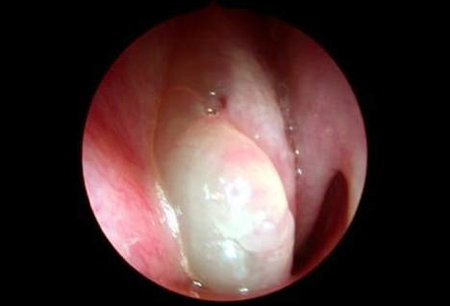Differentials
Nasopharyngeal polyposis
SIGNS / SYMPTOMS
Facial congestion/pressure/fullness occurs in 70% to 85% of patients.
Discoloured nasal discharge (anterior/posterior or both): occurs in 51% to 83% of patients.
Hyposmia (reduced sense of smell): occurs in 61% to 69% of patients.
Do not metastasise.
INVESTIGATIONS
Fluid-filled lesions on imaging.
Histologically benign.[Figure caption and citation for the preceding image starts]: Grade 3 nasal polypsFrom the collection of Dr Richard Hewitt [Citation ends].
Nasopharyngeal angiofibroma
SIGNS / SYMPTOMS
Do not metastasise, though locally aggressive. Almost exclusively presents in adolescent males.
INVESTIGATIONS
Highly vascular lesions on imaging.
Histologically benign.
Lymphoma
SIGNS / SYMPTOMS
Palatal perforation is a classic presentation of NK/T-cell lymphomas.[28] B symptoms (fever, night sweats, and unintentional weight loss) are more common with lymphomas than with nasopharyngeal cancer (NPC).
INVESTIGATIONS
Biopsy and flow cytometry show non-epithelial origin, in contrast to NPC, and classify type of lymphoma.
NK/T-cell lymphomas show angioinvasion and necrosis and stain for CD2, CD56.
Use of this content is subject to our disclaimer